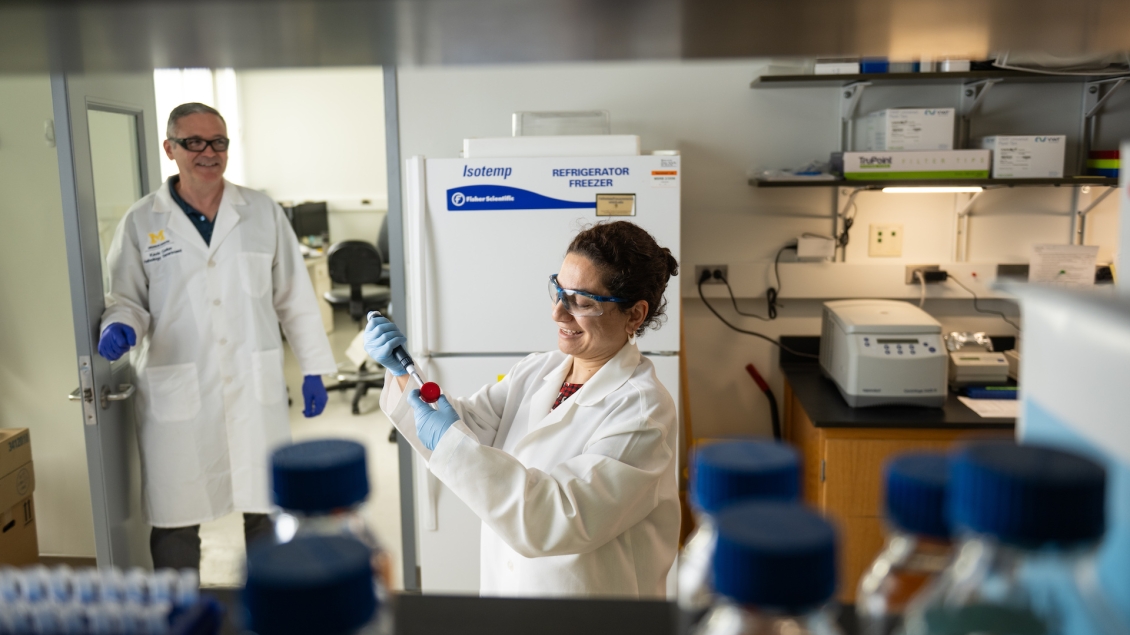
State-of the art identification, analysis, and quantitation of proteins
- This includes reduction/alklylation of cysteines, in-gel digestion with trypsin, followed by a standard 90 minute LC-MS/MS data acquisition, database search using Proteome Discoverer v2.4 (ThermoScientific) and delivery of results (as an Excel file uploaded to iLABs). Please see Sample Submission guidelines for tips regarding sample preparation and gel handling.
- Suitable for simple protein identification
- This service includes trypsin digestion followed by either 90 minute or 180 minute LC-MS/MS data acquisition. For more complex samples, 2D-LC separation can be performed followed by fraction collection, and LC-MS/MS analysis of each fraction, database search using Proteome Discoverer v2.4 (ThermoScientific) and delivery of results (as an Excel file uploaded to iLABs). The Investigator can decide the number of fractions to be analyzed after consultation with the laboratory manager.
- Suitable for global proteomic analysis (cells, tissues, body fluids etc), studying protein-protein interaction (IP, AP, BioID samples etc), PTM analysis, sub-cellular proteomes (organellomics, extracellular vesicles etc).
Post-translationally modified proteins represent only a small fraction of the total protein content and the ionization of modified peptide(s) is often suppressed in presence of huge number of unmodified peptides. Thus identification of PTM sites often requires enrichment of modified peptides or proteins and in general, require more starting material.
- Phosphorylation – Researcher will provide the requested amount of protein in MS-compatible buffer. PRF will perform phosphopeptide enrichment using metal oxide affinity or immobilized metal affinity chromatography followed by LC-MS/MS and preliminary data analysis. For global phosphoproteomic analysis, this can be combined with quantitative approaches (see below)
- Glycosylation – If the researcher wishes to perform Solid Phase Extraction of Glycopeptides (SPEG), the PRF can assist the Researcher in optimizing the extraction protocol. PRF will acquire and analyze the mass spec data. If no enrichment is done, PRF can search the data for glycosylation (no guarantee that any modifications can be found).
- Ubiquitylation – For global ubiquitylation studies, PRF recommends UbiFast protocol using diglycine-Ab from Cell Signalling Technology (CST). If the researcher wishes to perform enrichment of Ub-peptides, the PRF can assist the Researcher in optimizing the protocol. PRF will acquire and analyze the mass spec data. If no enrichment is done, PRF can search the data for Ubiquitylated peptides (no guarantee that any modifications can be found).
- Acetylation – There are antibody-based methods for enrichment of acetylated peptide/proteins (Ac-K antibodies from CST). If the researcher wishes to perform enrichment of Ac-peptides, the PRF can assist the Researcher in optimizing the protocol. PRF will acquire and analyze the mass spec data. If no enrichment is done, PRF can search the data for acetylated peptides (no guarantee that any modifications can be found).
- Methylation
- MS1-based
- SILAC
- MS2-based: (For lysis buffer compositions please read “Protocol” carefully) TMT (Protocol)
- TMT (Protocol)
PRM approach is employed for validating (eg. a potential biomarker identified during discovery phase) and/or more accurate quantitation of an analyte in a large cohort of samples. The instrument is set to isolate only analyte(s)-of-interest (i.e., specific m/z), fragment (HCD) and acquire MS/MS. This configuration can improve the sensitivity of detection and dynamic range of quantitation of the analyte. For absolute quantification, the experiment involves spiking-in a known amount of heavy-isotope labeled analyte into the peptide mixture derived from relevant sample matrix and monitoring both endogenous and heavy-isotope labeled peptides. Since the heavy-isotope labeled peptide is physico-chemically identical (except mass) to the endogenous peptide, they co-elute and the area under the curve (AUC) can be used to determine the concentration of the endogenous peptide. As PRM process requires optimization of experimental and data analysis pipelines, please contact the PRF beforehand to discuss the feasibility, sample requirements and cost of analysis.
Contact us to learn more.
- All our instruments use electrospray ionization (ESI) for introducing the sample into the mass spectrometer and are less tolerant to several buffer components (salts, detergents etc). While some of these can be removed using additional cleaning steps, these will result in loss of sample. To avoid these steps if possible, the Investigator is encouraged to discuss the sample preparation method with the laboratory manager beforehand.
- Most of the above services (except identification of Ubiquitination sites) can be performed using alternative enzyme. If enzymes other than trypsin are needed, the Investigator will provide the appropriate sequencing-grade enzyme.
- All kits/reagents needed for PTM enrichment (such as TiO2 or ZIC-HILIC) or quantitative profiling (such as ICAT, iTRAQ, TMT or heavy labeled synthetic peptides necessary for MRM) will be provided by the Investigator.
Please review the Submission Guidelines for information on sample preparation that is necessary for proteomic analysis by tandem mass spectrometry.
1150 West Medical Center Drive
Ann Arbor, MI 48109